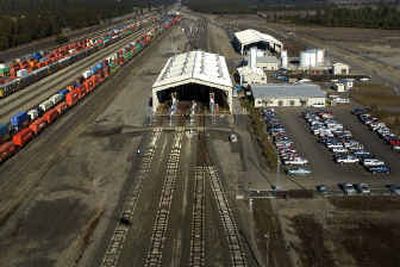Spill sparks outrage

HAUSER, Idaho – BNSF Railway Co. continues to operate its high-speed locomotive refueling depot despite mounting pressure to close the leak-plagued facility.
A coalition of Idaho lawmakers joined Kootenai County commissioners Wednesday in demanding the railroad suspend all fueling operations at its six-month-old depot over the Spokane Valley-Rathdrum aquifer.
Fuel-tainted wastewater was found Monday leaking from the refueling platform. A similar wastewater leak was discovered nearly two months ago and has already reached the aquifer 160 feet beneath the site.
The latest leak has penetrated at least two of the three barriers designed to protect the aquifer, said Marc Kalbaugh, site manager with the Idaho Department of Environmental Quality. The first line of protection, a layer of sealed concrete, has been breached; as has one of two high-density plastic membranes buried about 10 feet beneath the railroad tracks. There is no leak detection system below the outermost layer of plastic and the railroad is drilling for soil samples to see if the wastewater has escaped containment.
The Department of Environmental Quality is not calling the incident a fuel “release” because there’s no evidence of wastewater leaking from the outer plastic barrier, yet Kalbaugh admitted it’s too early to determine if the third plastic barrier remains intact. The two membranes are separated by less than a quarter inch.
“We just don’t know,” Kalbaugh said. “There’s just no way to observe beneath that last layer of containment.”
Because DEQ does not consider the incident a fuel spill, it did not immediately notify public health and environmental protection agencies in Washington. Officials in Washington said they were angered to first learn of the leak in Wednesday’s newspaper.
“We’ve heard nothing, nothing at all,” Washington Department of Ecology spokeswoman Jani Gilbert said Wednesday morning, nearly two days after the oily sheen was detected. “It’s 11 in the morning and we should have been notified.”
Dr. Kim Thorburn, chief health officer for the Spokane Regional Health District, said she had begun receiving information on the leak shortly before noon Wednesday. “We would really like it if DEQ would make that notification when they learned of it,” she said. “But we do understand that there’s not a lot of staff. The first thing we want them to do is respond when they need to.”
Kootenai County leaders were also frustrated, but their fingers were pointed toward BNSF Railway, which recently changed its name from Burlington Northern & Santa Fe Co.
Less than a month ago, company executives traveled to Coeur d’Alene to apologize for the first spill and pledge to keep county leaders better informed about potential problems at the depot. But county commissioners didn’t learn about the latest situation until nearly 24 hours after it was discovered, and had to call BNSF for detailed answers.
“We never heard from BNSF until we called them,” said County Planning Director Rand Wichman. “That’s significant to me.”
Commissioners faxed a letter to the railroad Tuesday evening demanding the facility stop refueling operations until a thorough investigation is conducted. The railroad has already stopped fueling on one of its three platforms, but the other two continue to service locomotives.
“We’ve asked them to be the good neighbors they should be,” said Commission Chairman Gus Johnson.
The permit for the depot gives county leaders the ability to halt operations at the facility if contamination occurs, Johnson said. The railroad had not responded to the county’s request as of 5 p.m. Wednesday, but a brief statement issued by BNSF spokesman Gus Melonas said “any appropriate and warranted actions” would be considered, “including a temporary suspension of operations.”
Melonas returned a reporter’s phone call Wednesday afternoon, but said he was too busy to answer further questions about the depot. “I’ve got to run,” he said. “I’ve got a derailment in Wyoming.”
Four state legislators from Kootenai County joined commissioners Wednesday in calling for a shutdown until all problems are corrected.
“The aquifer is too precious an asset to risk damage,” said the statement from Reps. Bob Nonini, R-Coeur d’Alene, and Frank Henderson, R-Post Falls; and Sens. Dick Compton and John Goedde, both Coeur d’Alene Republicans. Compton voted to approve the project in 2000 during his term as a county commissioner.
Nonini said the lawmakers want to back up what they consider “a reasonable request” from Kootenai County commissioners.
“I just think we need to assess the whole facility at this point, before we risk any serious damage,” he said. “To Burlington Northern’s credit, their early detection of this caught it.”
Idaho Gov. Dirk Kempthorne has not weighed in on the issue.
“If the local officials feel like it should be shut down, it’s their community,” said Kempthorne’s press secretary, Mike Journee. “I’m sure the governor would support whatever decision they would come up with.”
Only trace amounts of petroleum were found in groundwater samples taken after the first wastewater leak was detected in December, but public sensitivity is high surrounding the issue, said Barry Rosenberg, director of the Kootenai Environmental Alliance, which was one of the groups that spent years fighting depot construction.
“This supposedly fail-safe facility has failed again,” Rosenberg said. “It was an accident waiting to happen.”
Government officials said they fielded numerous calls Wednesday from worried and angry citizens.
Spokane resident Michael Cain said he was furious to learn of the second incident and spent much of Wednesday morning calling each of his elected representatives, ranging from City Council members to U.S. senators. He said he feels betrayed.
“It was a grievous failure of government,” Cain said. “I can’t remember the last time I was so outraged and felt so unprotected.”
Officials in Spokane and Coeur d’Alene insisted Wednesday that the region’s drinking water remains safe. But Cain said even a single drop of fuel is too much.
“It’s like having a small case of pancreatic cancer,” Cain said. “This isn’t a question of empirical data, this is a question of common sense.”